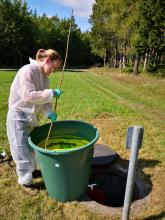How bacteria, viruses and antibiotic resistance genes spread in groundwater when the water quality changes due to climate change is being researched by a team led by hydrogeologist Prof. Traugott Scheytt of TU Bergakademie Freiberg, using the example of the Gallus spring near Hermetingen in the Swabian Alb. In September, the researchers added bacteria contained in commercial chili sauce to the water for this purpose.

To do this, the team dissolved a bottle of chili sauce in a water canister and let it percolate at a stormwater overflow basin not far from Gallus Spring. The researchers chose the unusual liquid because of the virus it contains. "The Pepper Mild Mottle Virus is harmless to humans, but it is present in high concentrations in food and can be detected in wastewater, making it ideal for this research question," says project leader Prof. Traugott Scheytt.
The researchers are specifically introducing nonpathogenic microorganisms into the groundwater with the experiments and analyzing how they flow through the subsurface over a distance of three to nine kilometers. "Now we're waiting for the chili sauce residues to seep through the karst rock of the Swabian Alb in the ground and arrive at the Gallus spring in Hermentingen." The goal of the research is to make the experiment reproducible without having to use special bacteria prepared in the laboratory. According to the team, about 25 percent of drinking water supplies come from karst rock. In addition to the Swabian Alb, this includes the Franconian Alb, parts of the Mediterranean region and areas in Thailand and China.
Climate change in groundwater
"Measurements have shown that climate change is leading to less water and poorer water quality in groundwater. Especially during heavy rain events, stronger microbial contamination by bacteria is then possible," says hydrogeologist Scheytt. With his team, he now wants to systematically record the spread of microbiological contamination in groundwater in the research project.
"In this way, we can detect bacteria, viruses and antibiotic resistance genes occurring during potential contamination events, identify sources and draw conclusions about the mobility of microorganisms. This is important in order to be able to take appropriate countermeasures," explains the hydrogeologist.
Background: DFG-funded research project PrePat
The joint project "Development and application of non-pathogens and extracellular DNA for predicting transport and attenuation of pathogens and antibiotic resistance genes in groundwater" aims to improve our understanding of the transport of bacteria, viruses and antibiotic resistance genes in groundwater. In addition to the TU Bergakademie Freiberg, the project partners are the TZW: DVGW Technology Center for Water in Karlsruhe and the TU Berlin. Three professors, three post-docs and one PhD student are involved in the work. The German Research Foundation (DFG) is funding the project with around €450,000 until 2025, and follow-up and supplementary projects are already being planned.